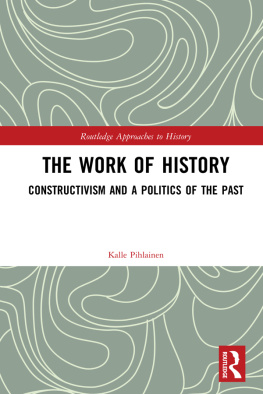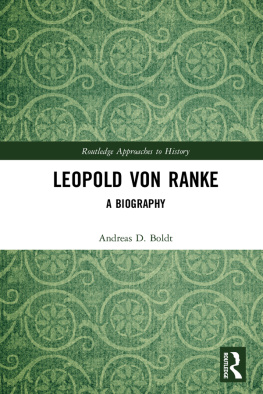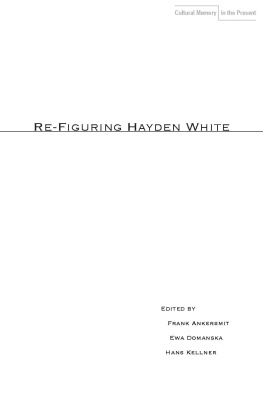Metahistory
METAHISTORY
The Historical Imagination in
Nineteenth-Century Europe

Fortieth-Anniversary Edition
HAYDEN WHITE
With a New Preface
Foreword by Michael S. Roth

1973, 2014 Johns Hopkins University Press
All rights reserved. Published 1973, 2014
Printed in the United States of America on acid-free paper
2 4 6 8 9 7 5 3 1
Johns Hopkins University Press
2715 North Charles Street
Baltimore, Maryland 21218-4363
www.press.jhu.edu
Library of Congress Cataloging-in-Publication Data
White, Hayden V., 1928
Metahistory : the historical imagination in nineteenth-century Europe / Hayden White ; with a new preface and a foreword by Michael S. Roth. Fortieth-anniversary edition.
pages cm.
Includes bibliographical references and index.
ISBN 978-1-4214-1560-4 (pbk. : acid-free paper) ISBN 978-1-4214-1561-1 (electronic) ISBN 1-4214-1560-7 (pbk. : acid-free paper) ISBN 1-4214-1561-5 (electronic) 1. HistoriographyHistory19th century. 2. HistoryPhilosophy. I. Title.
D13.W565 2014
907.204dc23 2014012497
A catalog record for this book is available from the British Library.
Special discounts are available for bulk purchases of this book. For more information, please contact Special Sales at 410-516-6936 or .
Johns Hopkins University Press uses environmentally friendly book materials, including recycled text paper that is composed of at least 30 percent post-consumer waste, whenever possible.
One can study only what one has first dreamed about.
Bachelard, The Psychoanalysis of Fire
CONTENTS
by Michael S. Roth
FOREWORD
All Youve Got Is History
Michael S. Roth
When you want to ask the question... what is man?, all youve got is history!
Hayden White
Hayden White has been the most important theorist of history over the last half century. Metahistory: The Historical Imagination in Nineteenth-Century Europe is his magnum opusindeed, its the book that most powerfully stimulated American humanists to link historical and theoretical issues. Yet, White in Metahistory does not present a theory of history in the sense traditionally of interest to philosophers or theorists; that is, the book does not provide a way of putting historical events together into a meaningful whole, nor does it provide a reasoned explanation of why this cannot be done. White is a theorist of history in the other sense of that word: the written account of past events. Whites subject is not, for example, whether the modern period is one of progress and freedom or one of domination and normalization; his subject is how the liberal and Foucauldian modes of representing the past form discrete events into coherent stories, into meaningful narratives. White probes the status of these stories, qua stories and qua histories, and he shows how they work as linguistic or rhetorical constructions. Finally, White offers a rhetorics of historical writing that challenges the ways we think about the possibilities of any theory of historical events.
In the late 1960s philosophy of history in America had only recently emerged from what we can call a Hempelian paradigm.
White came to reflect on the status of history, not from the position of a philosopher interested in epistemology and different modes of knowledge but as a medieval historian increasingly interested in the language through which the past is represented. White was certainly indebted to Giambattista Vico, the early eighteenth-century rhetorician and philosopher of history, but he was also a practitioner who saw his colleagues resisting theoretical questions by appealing to their special place as mediators between art and science. In Metahistory he made the point that this special place was preserved through theoretical torpor (xxxii). In an early, fiery essay, The Burden of History, White shows how the historians conception of both art and science was based on antiquated nineteenth-century notions. Historians had isolated themselves from the intellectual community by ignoring reflexive, self-conscious developments in science and art that emphasized the constructivist qualities of both enterprises. In this passionate and polemical essay, White exhorts historians to be not only more concerned with the connections between the pasts they study and the present from which they study them but to plunder the experimental developments in the arts and sciences for metaphors that will change the content of their concerns and the forms in which these are expressed. As White emphasized:
The burden of the historian in our time is to reestablish the dignity of historical studies on a basis that will make them consonant with the aims and purposes of the intellectual community at large, that is, we must transform historical studies in such a way as to allow the historian to participate positively in the liberation of the present from the burden of history.
Whites work since this essay has aimed at liberating historical writing and understanding from its modern burdensburdens that led, under the guise of professionalization and the pursuit of objectivity, to stifling conformity. For White, the professionalization of history as a discipline in the nineteenth century took place by repressing the personal, prophetic, and literary dimensions of writers efforts to make sense of the past. Metahistory attempts to awaken historians to these dimensions through a detailed interpretation of the works of some of the great nineteenth-century historical authors. White examines four types of realistic representation exemplified in the works of Ranke, Michelet, Tocqueville, and Burckhardt and four philosophical repudiations of nave realism in Hegel, Marx, Nietzsche, and Croce. Here, it seems, is intellectual history on the grand scale. The evolution of historical thinking has long been a preferred topic among historians, and, in going back to the nineteenth century, White was pointing to what he himself called their golden age. White took the philosophers of history more seriously than most of his colleagues would have (indeed, he claimed that their difference from real historians was only in emphasis not contentxxxi), but on the whole his subject was recognizably within this reflexive branch of intellectual history.
Metahistory has a basic ahistorical core with which historians have had great difficulty coming to terms but one that also gives the book genuinely theoretical import. White reads his nineteenth-century authors through the lens of literary theory, specifically theories of rhetoric and genre. For White, the four types of realism can be understood as four styles of emplotting historical events into stories. The genres were Romance in Michelet, Comedy in Ranke, Tragedy in Tocqueville, and Satire in Burckhardt. And the philosophers of history privileged particular tropes, or figures of speech: Marx emphasized Metonymy and Synecdoche to organize the historical field, whereas Nietzsche relied on Metaphor and Croce on Irony. None of these authors used a single genre or trope exclusively, but each of them represented the past through a preferred (or dominant) rhetorical function. Most important, White rejected the idea that one genre or trope was more appropriate for some historical event than another. He likewise rejected the idea that one genre or trope more accurately corresponded to what really happened in the past than another. Instead, he insisted that tropes were how writers prefigured the historical fieldthe past became available to us only through a poetic act of construction. Then writers made the past meaningful to readers by forming it into a plot. Acts of emplotment fell into these four main genres.
Next page








